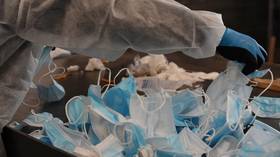WHO names another danger of pandemic

The huge amount of medical waste accumulated during the pandemic around the globe has become a health and environmental hazard, the World Health Organization (WHO) warned on Tuesday.
Billions of face masks, gloves, and full-body protective suits created some 87,000 tons of medical waste as the world battled Covid-19 between March 2020 and November 2021. Syringes, needles, and safety boxes from the vaccination drive added another 143 tons of litter, according to the agency.
Around 30% of healthcare facilities worldwide, especially those in poorer countries, were ill-equipped to cope with the existing waste before the emergence of the coronavirus. And the pandemic has put them under even more pressure, the WHO said.
The agency stressed the “dire need” to improve medical waste management systems, adding that both the government and the public would have to chip in for this goal to be achieved.
Investments must be boosted in the development of “non-burn waste treatment” technologies in order to protect the ecology, the WHO said.
It also advised producers to use “eco-friendly” packaging and shipping for medical products, as well as reusable equipment and recyclable or biodegradable materials.
“We find that people are wearing excessive PPE (personal protection equipment),” Dr. Margaret Montgomery, the technical officer of WHO’s water, sanitation, hygiene and health unit, said as cited by AP. “In terms of the volume, it’s enormous.”
The public should “become more of a conscious consumer” in order to help solve the medical waste problem, Montgomery pointed out.













